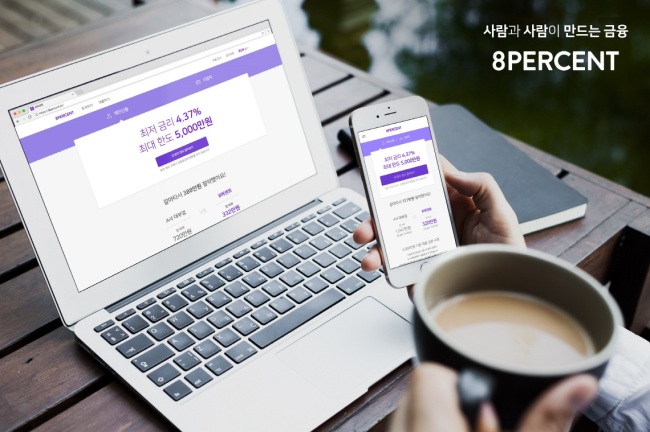The South Korean startup 8Percent, dedicated to peer-to-peer financing to individuals and small-sized business owners, announced Wednesday it had drawn a combined 6 billion won ($5.3 million) in investments from three venture capital firms.

The investments will be used to develop new credit analysis models, advance banking system and improve the profitability of lenders -- or investors into notes of borrowers -- the company said.
One of the venture capital firms involved was DSC Investment, while the other two have yet to be revealed.
Founded in November 2014, 8Percent is one of 175 P2P lending platform operators to have obtained a license from financial authorities as of the end of August.
In Korea, P2P platforms are considered one of the alternatives to borrowers with midrange credit scores, possibly reducing maximum interest rates for loans to nearly half compared to savings banks. At the same time, investors into borrowers’ notes can expect yields higher than those in bank deposits or savings account.
By Son Ji-hyoung
(consnow@heraldcorp.com)
One of the venture capital firms involved was DSC Investment, while the other two have yet to be revealed.
Founded in November 2014, 8Percent is one of 175 P2P lending platform operators to have obtained a license from financial authorities as of the end of August.
In Korea, P2P platforms are considered one of the alternatives to borrowers with midrange credit scores, possibly reducing maximum interest rates for loans to nearly half compared to savings banks. At the same time, investors into borrowers’ notes can expect yields higher than those in bank deposits or savings account.
By Son Ji-hyoung
(consnow@heraldcorp.com)




![[KH Explains] No more 'Michael' at Kakao Games](http://res.heraldm.com/phpwas/restmb_idxmake.php?idx=644&simg=/content/image/2024/04/28/20240428050183_0.jpg&u=20240428180321)


![[Grace Kao] Hybe vs. Ador: Inspiration, imitation and plagiarism](http://res.heraldm.com/phpwas/restmb_idxmake.php?idx=644&simg=/content/image/2024/04/28/20240428050220_0.jpg&u=)











![[Herald Interview] Xdinary Heroes shoot for the next level with 'Troubleshooting'](http://res.heraldm.com/phpwas/restmb_idxmake.php?idx=642&simg=/content/image/2024/04/29/20240429050745_0.jpg&u=)